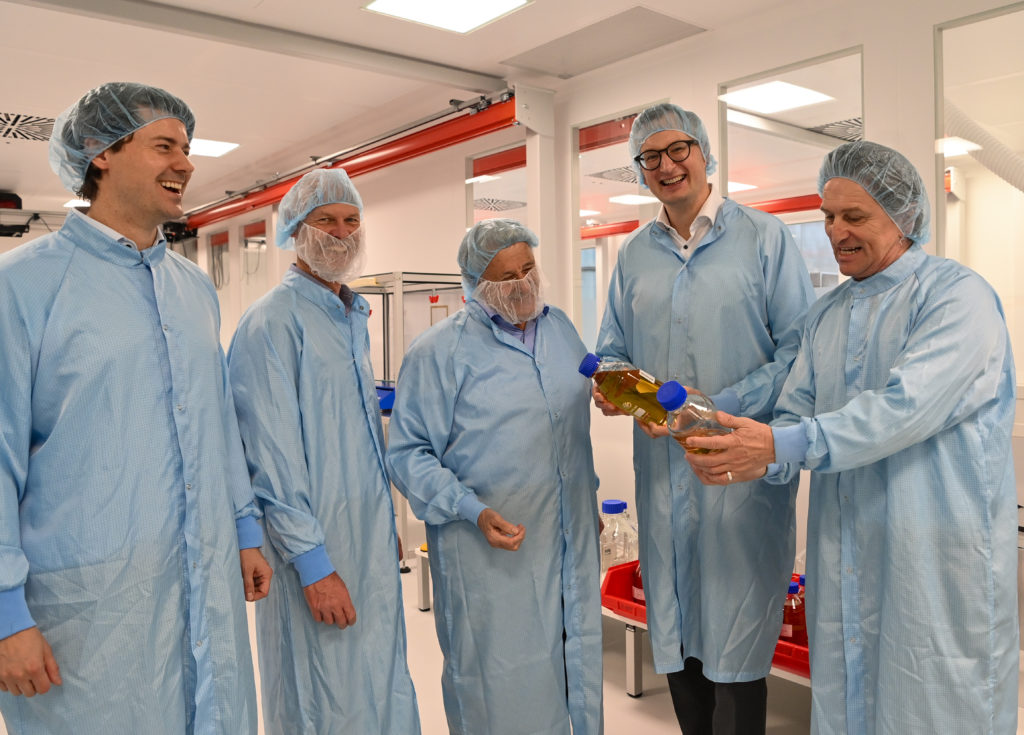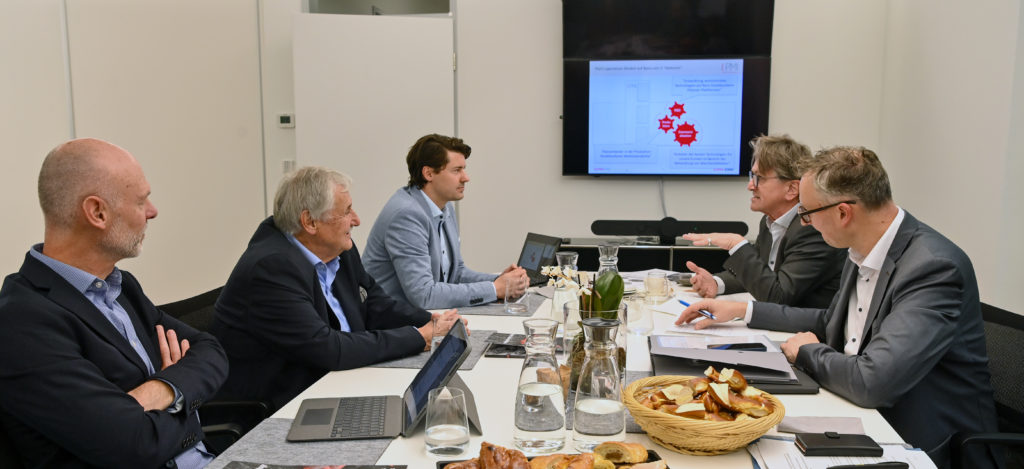Polymedics Innovations (PMI) welcomed Health Minister Manne Lucha (Green Party) and Andreas Schwarz, Chairman of the Green Party parliamentary group, to the company’s new premises in Kirchheim/Teck on November 13, 2023. The guests had come to get an idea of the opportunities and, above all, the challenges a medical technology company faces in Baden-Württemberg. Together with the Mayor of Kirchheim, Pascal Bader, the owners Prof. Heinrich Planck and Christian Planck gave the visitors a tour of the company and showed them the steps PMI is taking to “revolutionize wound healing”. PMI heralded a paradigm shift in the treatment of burns two decades ago with its Suprathel skin substitute material.
Word of mouth to the leading solution
To welcome his guests, Prof. Heinrich Planck gave them a brief history of the company, which he founded in 2001 together with four other scientists. His dream of developing a replacement skin had been with him since his student days, said the senior director of PMI. With Suprathel, a synthetic skin replacement material, this dream has come true: The product has been approved in Germany since 2004 and has a market share of 70 percent in the treatment of second-degree burns in this country. Supra SDRM, a matrix for the treatment of chronic and acute wounds, has also been approved in Germany and Europe since the summer of this year. The company’s own products are complemented by the innovations in wound healing Novosorb BTM, Recell and Nexobrid.
However, Germany is no longer PMI’s largest market, added his son Christian Planck as he showed the guests around the building. The new 3,000 square meter building is designed for further expansion with clean rooms for the production of Suprathel and Supra SDRM. PMI currently sells its products for burn treatment and wound healing in around 40 countries.
Global wound healing in the focus of PolyMedics Innovations
The USA is now PMI’s largest market. However, the country is not only important because of the turnover that PolyMedics Innovations generates there. “If we want to get a medical device approved in the USA, we have a clear cost and time frame,” says Christian Planck. “We know that approval will cost us a fixed amount and that we will receive approval or rejection from the US FDA within 6 months. We can also ask questions, especially about the requirements for approval. In Germany, a notified body that deals with approval in accordance with the MDR (EU Medical Device Regulation) is not allowed to provide any information on the requirements.” It is also difficult to understand why a product such as the Suprathel skin substitute, which has been on the market for more than a decade and served tens of thousands of times since 2004 without any complaints, has been subject to a two-year recertification process under MDR. PMI had to invest several hundred thousand euros and man-years in this MDR process before it was successfully completed.
According to the PMI Managing Director, who has lived and worked in the USA himself for a long time, this means that a medical technology company from Baden-Württemberg prioritizes the American market before the European market follows. On average, patients in Germany have to wait four to six years longer for a medical device to become available.
Health Minister Manne Lucha explained that insurance-based approval was being pursued in Europe. This would prevent lawsuits for damages in the millions, which can be sought by individual patients in the USA. The aim must be to maintain the positive aspects of the European system and to learn from the American system.
Suggestions for improvement from the field
For his visitors Andreas Schwarz and Manne Lucha, PMI CEO Christian Planck had compiled a collection of concrete proposals to provide Baden-Württemberg medical technology companies with better opportunities in their own state. In addition to uniform assessments and binding consultation options for the approval of new products, the list included improving the remuneration of innovations in the outpatient sector and a state-wide pooling of resources for conducting clinical trials. Christian Planck also spoke out in favor of simplified migration of skilled workers, high-quality education and training and more political support for small and medium-sized enterprises as they expand internationally.
Health Minister Lucha and Green Party leader Schwarz thanked Prof. Heinrich Planck and Christian Planck for their insights into practice. Andreas Schwarz held out the prospect of setting up a regional working group, while Manne Lucha praised the PMI owners’ commitment to Baden-Württemberg as a business location and the concrete suggestions.




